New Google Chromebook is $249, swaps x86 for ARM

Google and Samsung are giving Chromeboook a mighty big makeover -- smaller screen, lower price and something unexpected: ARM processor. Say goodbye to x86, baby, and hello to $249 selling price, which is $200 less than Samsung's Series 5 550 model. The architectural change comes as Microsoft and its OEM partners prep ARM-based Windows RT computers for release in just eight days. Like Windows 8 systems, future Chromebooks will have either ARM or x86 processors.
ARM means there's more Samsung in the new model than ever before, which includes the microprocessor. That makes the new Chromebook a lot closer to an end-to-end product that Apple might make. Judging from Google-Samsung success with Galaxy Nexus, which feels integrated all the way -- hardware, services and software -- the new Chrome OS device promises much. Kilogram for kilogram, the device is ready to stand against MacBook Air, which offers same screen size and similar dimensions but starting price is $750 more. Then there are ultrabooks, some of which sell for even more than Apple's laptop.
Google looks to steal Windows Phone 8 thunder with competing Android launch
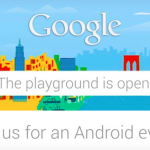
Could the end of October be any more jam-packed? October 29, same day Microsoft launches Windows Phone 8 in San Francisco, Google will hold an event in New York for Android -- presumably for the next Nexus device(s), just about the worst kept tech secret(s) of the month. Microsoft just can't catch a break. This week, Apple sent out media invites for an October 23 shindig, possibly for iPad mini, coming three days before Microsoft launches Windows 8 and Surface tablets.
Yeah, it's a tough month to be Microsoft -- what, with the company's future hanging on the three products and post-PC, connected-device era stumpers Apple and Google looking to dampen Windows' big days. But what a month for gadget geeks -- and the October 26 and 29 events coming on my three sisters' birthdays (twins, in case three on two days puzzles you): Android devices, iPad mini, Surface, Windows 8, RT and Phone. And, hey, what about some of those new smartphones, like LG Optimus G?
Developers give Internet Explorer 10 for Windows 7 Preview cold reception

Whoa, and I thought BetaNews commenters were a rowdy lot. Today, Microsoft announced that Internet Explorer 10 would come to Windows 7 next month as a "preview". I would think that would be welcome news, but not to cranky complainers at Microsoft's IE blog.
"We will release a preview of IE10 on Windows 7 in mid-November, with final availability to follow as we collect developer and customer feedback", Rob Mauceri, IE group program manager, posts. "We look forward to getting your feedback on IE10 on Windows 7, and will provide another update when the preview is available".
Tough luck, iPad, Android owners read tablet publications more often
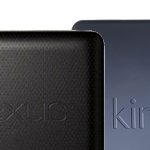
More Americans are discovering what I did, after buying the original iPad more than two years ago: Reading ebooks, magazines and newspapers on a tablet is an immersive experience and often much more satisfying than print. Today, comScore says that in August, two out of every five US tablet owners read a newspaper or magazine and one in 10 did so almost every day.
The numbers' meaning is greater when taken in context of another. Pew says that during the same month, one in four Americans used a tablet (22 percent as owners, 3 percent borrowing one belonging to another household member). Make no mistake, magazines and newspapers are going digital in ways like nothing seen on the Internet, because of publishers' ability to deliver richer content -- at that, more frequently -- and actually make money doing so.
Business spends b-b-b-big on Big Data

IT organizations will spend 28 billion bucks on Big Data this year, Gartner says today. Expect $34 billion next year, if the forecast holds true. But big spending surprisingly doesn't much benefit enterprise software vendors. Most of the money goes into adapting what businesses already have, with the trend generating just $4.3 billion in software sales this year.
"Despite the hype, big data is not a distinct, stand-alone market", Mark Beyer, Gartner research vice president, says, "but represents an industrywide market force which must be addressed in products, practices and solution delivery". Biggest spending, some 45 percent a year, goes into content analytics and social network analysis -- that sounds like "data mining" to me. But, hey, analysts make money coining terms and offering consulting services around them.
Will you buy Surface RT?
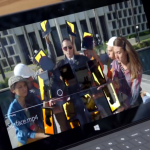
Today, Microsoft started taking pre-orders for Surface RT, one of its two branded tablets. The other, which isn't formerly priced, will cost more and comes with Windows 8 Pro. RT prices range from $499 to $699, on par with the new iPad. Microsoft chose not to sell the tablet against lower-cost Androids, such as Samsung Galaxy Tab 2 10.1, which Amazon has for $359.
Surface marks Microsoft's first real push into the tablet market. True, the company released Windows XP Tablet Edition a decade ago but OEMs shipped hardware. Now Microsoft competes with them, by offering its own device, which is optimized for its software and services and ships free of bloatware.
Apple hosts October 23 'screw you, Microsoft' media event
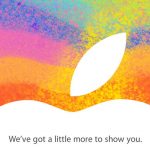
The invitations are out, and rumors proved true. Apple will hold a special press event, presumably for iPad mini, on October 23 -- that's three days before Microsoft launches Windows 8 and Surface tablets. Talk about party crashing. Apple almost surely will steal much of its rival's thunder, splitting media coverage and assuring that most every Windows 8 or Surface blog post or news story will mention Apple and iPad mini.
Anyone who thinks the timing isn't deliberate lives in lala land. Capitalism is all about brutal competition, and if iPad mini debuts next week Apple will heap hot coals through Microsoft's Windows and onto its shiny Surface. InterWeb writers have obsessed about the rumored tablet for weeks. Its arrival will be almost as blah blah worthy as Steve Jobs returning from the dead.
Microsoft prices Surface RT against iPad
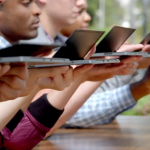
Well, file this in the don't believe anything you read on the Internet department. Contrary to relentless rumors that Microsoft Surface would start at $199, actual cost will be $300 more. Rather than price against tablets selling for $299 or less, Surface competes with iPad, while offering more storage for less cost. But iPad has the way upper hand on screen resolution, which is a compelling feature.
At Noon EDT today, Microsoft started taking pre-orders for Surface, following a gaffe that temporarily offered the tablet and revealed pricing -- $499 to $699 for three models. The entry-level 32GB tablet is $499, same as new iPad, which is 16GB. The $599 Surface adds detachable keyboard cover, and the $699 model bumps storage to 64GB. Pre-orders are for the model running Windows RT. Microsoft hasn't announced pricing or started pre-orders for the Windows 8 tablet. As previously reported, Surface RT launches alongside Windows 8 on October 26. Yesterday, Microsoft kicked off the tablet's ad blitz.
No one can accuse Microsoft Surface marketing of copying Apple iPad

That didn't take long. A day after debuting the first Windows 8 TV commercial, Microsoft puts out another -- this one for Surface. There's a theater of the bizarre quality about the ad spot, which features lots of folks dancing with tablets. I half expected to see digitally-inserted cameos with Fred Alistair and Ginger Rogers. No one could accuse Microsoft of copying Apple iPad marketing, that's for sure.
The commercial focuses on Surface's attachable keyboard and pop-out stand and the click sounds they make. There is lots of action centered around clicking. You won't learn anything about what Surface does from the one-minute jig or how much the tablet costs (oh, do we want to know). But people will remember the commercial, the slate and the colorful Modern UI. That's the whole point of advertising: get people to remember something.
AT&T starts LG Optimus G preorders Oct. 16, sales Nov. 2
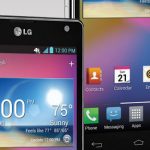
AT&T's hottest smartphone of the season (well, so far) arrives in 18 days, and it's not iPhone 5. America's second-largest carrier has queued up the LG Optimus G, which will be available for $199.99 on contract -- that means two-year commitment. Optimus G specs impress, particularly that quad-core Snapdragon S4 processor, but the software somewhat disappoints. The device ships with Android 4.0.7, not successor Jelly Bean unveiled in June. Upgrade may be months away.
Older software mars what otherwise is a beauty: 4.7-inch TrueHD IPS+ display, 1280 x 768 resolution, 15:9 aspect ratio; 1.5GHz Qualcomm Snapdragon S4 Pro processor; 2GB RAM; 32GB storage (internal and card, expandable to 80GB); 8-megapixel rear-facing and 1.3MP front-facing cameras, zero-lag shutter; 4G LTE; Wi-Fi; A-GPS; MHL; DLNA; near-field communication; Bluetooth 4.0; and 2,100 mAh battery. Measures 131.9mm x 68.9mm x 8.45mm and weighs 145 grams.
What Windows 8 Pro means to you (and Microsoft, too)

Microsoft announces calendar third-quarter earnings in three days, and during the conference call, as usually is the case, some financial analyst almost surely will ask about the percentage of professional to consumer versions sold, since the former typically yields higher margins. But that question may soon be a thing of the past, as Microsoft seeks long-term gains from a little short-term pain. The Redmond, Wash.-based company is quietly, but quite deliberately, trying to put Windows consumer, once called Home, out to pasture (hopefully with a bullet in its bytes).
The signs are everywhere. In April, Microsoft reduced the number of Windows editions to three -- 8, Pro and RT -- or four when looking at volume-licensing-only Enterprise. Most people can't buy Windows 8 Enterprise or RT (which is preloaded only). They also can't buy the consumer edition -- yet -- and Microsoft makes it awfully damn easy to get Pro. Existing users of most any version of Windows going back to XP can, until Jan. 31, 2013, upgrade to 8 Pro for $39.99. That's a helluva bargain, and the lowest launch promotional price for a professional Windows edition ever. Meanwhile, buyers of new Windows 7 PCs starting June 2 get a $14.99 free upgrade -- to Pro 8. Last week, Microsoft and retailers started taking boxed Windows 8 Pro upgrade preorders for $69.99. Windows 8 "consumer" upgrade isn't available. Is the pattern clear enough?
Windows reimagined: 'Only Want You'
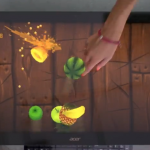
Well, hello, Windows 8 advertising. Microsoft smartly chose tonight's "The Walking Dead" season 3 premiere (and perhaps other programs I didn't watch) to kick off marketing for the new operating system. Considering post-PC advocates treat Windows as something like an undead creature, there's certain appropriateness to using the popular AMC series.
I'm stoked about the first commercial, "Windows 8 is coming soon", which begins with blast-off countdown "10, nine, eight, eight, eight..." I love the exploding laptop, because everything is changed, baby. The spot moves fast, uses jump cuts to bounce around and tells you absolutely nothing specific about Windows 8 other than release date: "10-26-12".
Saturday Night Live iPhone 5 skit pits tech bloggers against Chinese peasant laborers

Last week's Saturday Night Live Season opener, with Daniel Craig hosting, really disappointed. But last night's show returned to form, with host Christina Applegate. Among the highlights, and somewhat appropriate for a host with "Apple" in her name, is a skit about iPhone 5. SNL is often best when using humor to make social commentary and, whoa, does it in the new episode.
I have embedded the official video from NBC but can't be sure it will be visible to international readers. If you can't view the SNL skit, try this user-posted YouTube video (and hope NBC doesn't demand its removal).
Amazon tells Kindle customers to expect buying credit, thanks to ebook price-fixing settlement

I bought my first ebook in 1999 and in recent years stopped purchasing print altogether. My wife is a relative ebook newbie, so I am surprised that she and not me received an email today from Amazon about a forthcoming purchasing credit. Perhaps you got a similar message.
In April, the Justice Department accused Apple and five publishers -- Hachette SA, HarperCollins, Macmillan, Penguin and Simon & Schuster -- of fixing ebook prices. Three publishers settled; MacMillan and Penguin, along with Apple, refused. The three publishers also settled with states attorneys general, agreeing to put $69 million in a fund for consumers. The Amazon purchasing credit is product of the settlement.
Windows 8-Nexus 7 packaging separated at birth
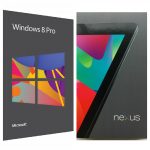
What the frak? Did Microsoft hire the same artist for Windows 8 packaging that Google used for Nexus 7? Because I am absolutely struck by similar color choices and graphic fluidity. You wouldn't confuse the boxes on a store shelf, because the products would be nowhere near one another. But one wonders if Google tapped a new trend in graphic box design, and Microsoft just copied along.
Before posting, and as sanity check, I asked colleague Tim Conneally about the boxes. "The similarity is kind of shocking", he responded. "That gunmetal grey color was nowhere to be seen in tech two years ago".
Joe's Bio
Joe Wilcox is BetaNews executive editor. His motto: Change the rules. Joe is a former CNET News staff writer, JupiterResearch senior analyst, and Ziff Davis Enterprise Microsoft Watch editor.
Ethics Statement© 1998-2025 BetaNews, Inc. All Rights Reserved. About Us - Privacy Policy - Cookie Policy - Sitemap.
